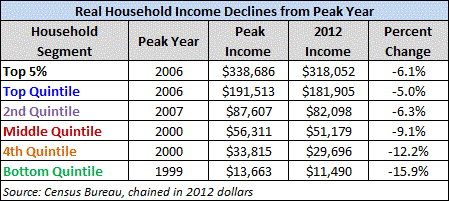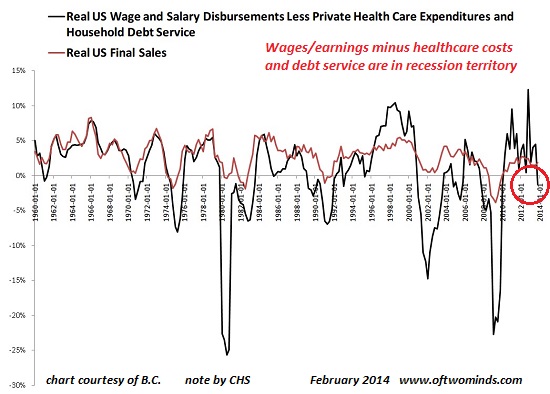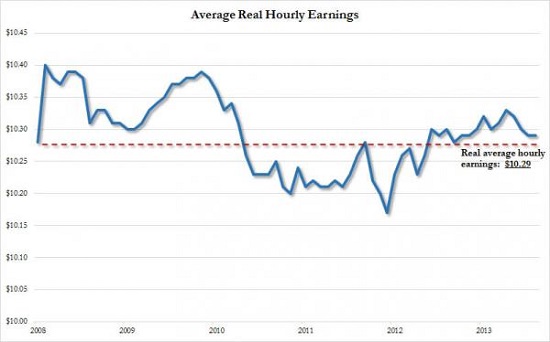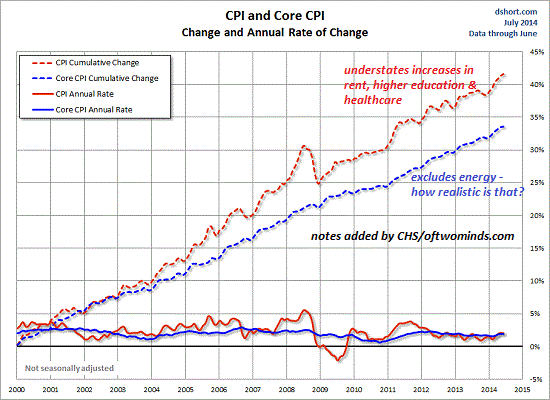You can print all the money you want, but it will never boost wages to keep up with prices.
Central banks have been pursuing two goals for the past six years: ignite inflation and an expansion of debt that will supposedly generate "growth." Despite squandering trillions of dollars, yen, yuan and euros, central banks have failed to ignite sustainable inflation or growth.
There's nothing mysterious about their failure: you can't get "good" inflation or growth if wages are stagnant or declining.
The central banks don't bother to distinguish between "good" and "bad" inflation: any and all inflation is considered not only wonderful but essential to propping up the Ponzi scheme of debt-dependent consumption, a dynamic I described in Central Banks Create Deflation, Not Inflation.
"Good" inflation is wages rising faster than prices. When wages rise faster than consumer prices, households have more money to spend on consumption, and it's progressively easier for them to pay down debt and support additional borrowing.
"Bad" inflation is prices rising while wages stagnate. In "bad" inflation, prices keep rising as central bank money-printing devalues the currency, but wages don't rise along with prices. As a result, wages decline in real terms, i.e. purchasing power.
In Japan, where the central bank and government have struggled for years to generate price inflation as the means to "re-start growth," wages have fallen by 9% in real terms since 1997. (source:Voodoo Abenomics: Japan's Failed Comeback Plan Foreign Affairs)
These charts reflect the stagnation of American wages and household incomes.
Real household income has declined across the entire income spectrum:
Deduct healthcare expenses and debt service, and what's left of wages for the rest of life's expenses is tanking: Courtesy of longtime correspondent B.C.:
Meanwhile, the purchasing power of wages is in steady decline:
The point is that lowering interest rates to zero and issuing unlimited free money for financiers to generate asset bubbles has had a negative effect on wages and household income. This is not accidental or bad luck--central bank money-printing and bond-buying have not had any positive effect on wages because they cannot possibly have any positive impact on wages.
In effect, central banks have been trying to pound nails with a handsaw: they don't have the tools to counteract the deflationary influences of labor surplus. Wages are stagnating/declining not because money isn't cheap enough or assets aren't high enough; wages are in structural decline due to three factors:
1. Global wage arbitrage: everybody is competing with everyone else globally for work that is tradable or that can be commoditized
2. Costly human labor is increasingly replaceable with software and robotics
3. The rising costs of labor overhead (social welfare taxes, healthcare, etc.) push employers' costs higher even as employees' paychecks stagnate or shrink.
These are global factors, affecting employers everywhere from the U.S. to China. No amount of liquidity or free money can reverse these structural trends.
Frantic voices can now be heard suggesting central banks issue free money directly to households. Considering central banks have stolen hundreds of billions of dollars in interest from saver-households in the past six years, there is a painful irony in these calls for free money to households, now that free money for financiers has failed so catastrophically.
A free money giveaway won't fix anything; all it would do is give households the means to pay down a bit of debt or make interest payments on subprime auto loans for another month or two. Free money giveaways are not a substitute for earned income.
Debt jubilees won't work either, as all the debt that proponents want to cancel is an asset to somebody else--and often that "somebody" is a public or private pension fund or another worker's 401K retirement fund.
The game has been lost, but central bankers are still on the field, wandering around in disbelief that their unspeakable powers to issue money and credit have failed. You can print all the money you want, but it will never boost wages to keep up with prices.
Get a Job, Build a Real Career and Defy a Bewildering Economy(Kindle, $9.95)(print, $20)
 Are you like me? Ever since my first summer job decades ago, I've been chasing financial security. Not win-the-lottery, Bill Gates riches (although it would be nice!), but simply a feeling of financial control. I want my financial worries to if not disappear at least be manageable and comprehensible.
Are you like me? Ever since my first summer job decades ago, I've been chasing financial security. Not win-the-lottery, Bill Gates riches (although it would be nice!), but simply a feeling of financial control. I want my financial worries to if not disappear at least be manageable and comprehensible.
And like most of you, the way I've moved toward my goal has always hinged not just on having a job but a career.
You don't have to be a financial blogger to know that "having a job" and "having a career" do not mean the same thing today as they did when I first started swinging a hammer for a paycheck.
Even the basic concept "getting a job" has changed so radically that jobs--getting and keeping them, and the perceived lack of them--is the number one financial topic among friends, family and for that matter, complete strangers.
So I sat down and wrote this book: Get a Job, Build a Real Career and Defy a Bewildering Economy.
It details everything I've verified about employment and the economy, and lays out an action plan to get you employed.
I am proud of this book. It is the culmination of both my practical work experiences and my financial analysis, and it is a useful, practical, and clarifying read.
Test drive the first section and see for yourself. Kindle, $9.95 print, $20
"I want to thank you for creating your book Get a Job, Build a Real Career and Defy a Bewildering Economy. It is rare to find a person with a mind like yours, who can take a holistic systems view of things without being captured by specific perspectives or agendas. Your contribution to humanity is much appreciated."
Laura Y.
Gordon Long and I discuss The New Nature of Work: Jobs, Occupations & Careers(25 minutes, YouTube)
NOTE: Contributions/subscriptions are acknowledged in the order received. Your name and email remain confidential and will not be given to any other individual, company or agency.
| Thank you, Dan S. ($100), for your outrageously generous contribution to this site-- I am greatly honored by your steadfast support and readership. |
|


 Are you like me? Ever since my first summer job decades ago, I've been chasing financial security. Not win-the-lottery, Bill Gates riches (although it would be nice!), but simply a feeling of financial control. I want my financial worries to if not disappear at least be manageable and comprehensible.
Are you like me? Ever since my first summer job decades ago, I've been chasing financial security. Not win-the-lottery, Bill Gates riches (although it would be nice!), but simply a feeling of financial control. I want my financial worries to if not disappear at least be manageable and comprehensible.




























